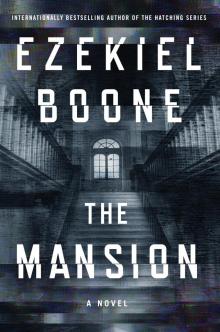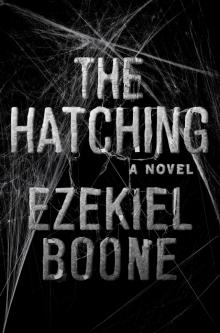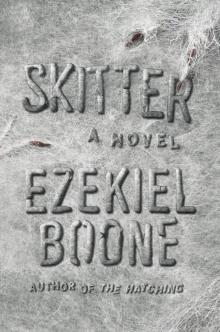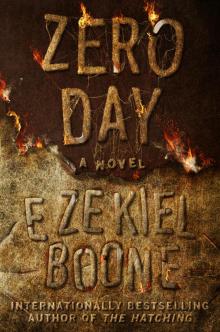- Home
- Ezekiel Boone
The Hatching Page 15
The Hatching Read online
Page 15
Stornoway, Isle of Lewis,
Outer Hebrides, Scotland
The plane was late. It was bad enough that Aonghas Càidh saw his girlfriend only every two weeks, but usually he was the one flying to her. Somehow it felt harder to have to wait for her plane from Edinburgh than it did to wait when his own plane was delayed.
It could have been worse, he supposed. He wasn’t even sure how he’d managed to end up dating somebody like Thuy in the first place. He wasn’t a bad bloke. He was smart enough to make a decent living—he’d taken over the writing of his grandfather’s potboiler detective novels, a very successful series that had been in print for more than fifty years and seemed like it still had steam as long as Aonghas didn’t make a bollocks of it—and he was generally considered good company. He was funny and had a lot of stories to tell, most of them involving being raised by his grandfather in the old castle on Càidh Island, their family castle and family island with their family name, an otherwise unpopulated rock in Loch Ròg, on the west side of the isle in the remote Outer Hebrides. His stories of being six and motoring from Càidh Island across storm-whipped waters so he could get to the Carloway Primary School—he was one of fewer than forty students on the rolls—or the time his grandfather knocked himself unconscious in the cellar and Aonghas had to wait two hours for him to come around, made him seem like an exotic creature to his friends.
Aonghas was in his early thirties, and until he met Thuy, he’d been the only one of his friends who wasn’t in a stable, committed relationship, despite their repeated attempts to set him up. Sure, he was a little plush around the belly, but he had the kind of big frame that carried it well; if he’d been a little less lazy, he would have done well out on the fishing boats. He had an easy way of talking, and women seemed to like him. But he really couldn’t believe Thuy was his girlfriend. She was athletic, gorgeous, and smart as hell: she’d just missed qualifying for the Olympics in the two hundred-meter freestyle, and had worked for a couple of years as a model before deciding to go to medical school. She was also unbelievably nice and thoughtful, the kind of woman who spent her free time volunteering at animal shelters and never passed a homeless person without dropping some money in their cup. All that, and she liked to cook. He was pretty sure it was a miracle she was his girlfriend. He knew the truth, which was that not being a bad bloke wasn’t really enough to justify having a woman like Thuy fall in love with him. Still, who was he to question the vagaries of the human heart? Or, as his grandfather had put it: “Don’t be such an ass. If the lass loves you, she loves you. Take what little gifts this life has to offer.”
He met Thuy when she came to Stornoway for vacation. She’d walked into the Kenneth Street coffee shop he liked to write in. Three mornings in a row she’d come through the door with a backpack and hiking gear, and three mornings in a row he’d been sitting at a table in the back, hacking away at the newest Harry Thorton mystery, each word he wrote enriching his bank account ever so slightly. Finally, on the fourth morning, Aonghas worked up the courage to talk to her. It was the wrong time of year for tourists, and she would have stood out even if she hadn’t been Vietnamese and ridiculously good-looking. Aonghas didn’t admit it to her until they’d been dating for nearly six months, but he’d been surprised when she’d spoken to him and didn’t have an accent. She was as Scottish as he was. They’d talked for a while about what she was doing there—she was in medical school and had a vacation and wanted to do some hiking—and he’d suggested a nice walk and a couple of places she might like to eat, and then he’d given her his phone number. They’d gone hiking together the next day and had hit it off.
They had five more days together before she headed back, but he’d already had a trip to Edinburgh planned for three weeks later, and ended up staying at her place. Somehow, it worked out. Even with writing the Harry Thorton books and motoring over to Càidh Island to check in on his grandfather every couple of days, Aonghas had enough free time that it was easy to take the one-hour flight to Edinburgh every other weekend. And here and there, when she could, she’d sneak away to the Isle of Lewis for a few days: she preferred coming to him, she said, and he believed her. She seemed to love the island as much as he did, and arranged to do her residency in Stornoway when she graduated. Two months, Aonghas thought. Two months and he’d get to see her every day, wake up with her every morning.
And with any luck, he thought, as he saw Thuy’s plane come bursting through the clouds that hung over the ocean, two months from now would be the beginning of always.
He fingered the box in his pocket. He’d brought the ring with him the last time he’d gone to Edinburgh, two weeks ago, but it hadn’t felt right, and he’d finally realized why he was hesitating: she’d never met his grandfather. Even though they’d been together for a year, Aonghas had never taken Thuy out to Càidh Island. At first, he’d hesitated because he wasn’t sure it was serious, and then he’d hesitated precisely because it was serious. Padruig could be intimidating, and while Aonghas didn’t want it to be true, he knew that if Padruig disapproved of Thuy, it would signal the death knell of the relationship. So there was a lot riding on this weekend. And he had to admit, he was scared shitless at what would happen when Padruig and Thuy came together.
The drive to the coast on the other side of the isle took only an hour, and he’d never seen Thuy so excited.
“You think he’ll like me?”
He pulled her bag out from the backseat and then picked up his own bag, shutting the door of the Range Rover with his hip. “He doesn’t really like anybody, Thuy. God, I’ve told you enough stories about how cranky he is. He can be a bit of a cunt at times.”
She smacked him on the head. Not hard. But still. “Don’t talk about him like that. He raised you.”
Aonghas stepped over the rail of the boat and tucked their bags in the cabin. He’d loaded his grandfather’s boxes already: three coolers full of milk, dairy, and fresh produce—more than usual, because he and Thuy were staying—plus mail and two boxes of books and magazines. He held Thuy’s hand to help her on board, and then pulled her tight against him. He could feel her pressing against the ring box in his front pocket.
“He didn’t have much of a choice about raising me, Thuy. He wasn’t going to let his grandson go to the orphanage, and after my parents died . . .” He shrugged. “But you’re right. He’s a good man. He’s a tough bastard, and he has his ways, but I love him, and he’ll love you, Thuy. I promise. I love you, and I love him, and love’s the sort of bridge we can all cross over.”
“You say pretty things sometimes,” Thuy said, and then she kissed him and went forward while he started the boat.
That was one of the other things he liked about her. He could say stuff like that—that love was a sort of bridge. He could read poetry and good books, and she never, ever, tried to tell him that he should write a “real” book, that he was wasting his time on the Harry Thorton novels. He’d had girlfriends before who pushed him, and in the end, he had to admit he loved those damned mysteries more than he’d loved any of those old girlfriends. He’d grown up with the books, helped his grandfather come up with new plots for them—two books a year, every year, for as long as Aonghas could remember—and taking over the writing of them was all he’d ever wanted to do.
He looked at the way Thuy sat near the bow and marveled again at his luck. She should have been a painting, the way she looked against the water. The weather never seemed to bother her, and even though it wasn’t that cold, there was a bit of spray coming off the water. He liked watching the way she leaned into the wind, how she zipped her jacket but let the hood stay down, catching the mist on her face. Two more months. Two more months. He said it over and over in his head like a mantra. Two more months and she’d be doing her residency in Stornoway. The idea of living with Thuy, of having her on the Isle of Lewis all the time, not just for a long weekend every couple of months, was enough to make Aonghas almost burst with happiness. He patted the ring again.
/>
She was going to say yes. She had to. He couldn’t think about her saying anything else. He felt sick and knew it wasn’t the waves or the water: they’d never bothered him. It was the gauntlet of facing his grandfather.
They rounded the eastern edge of Càidh Island, and he saw the familiar harbor and the castle standing on the bluffs. Thuy gasped, and he smiled. He’d tried to tell her, but nobody ever believed it until they saw it. It wasn’t a big castle, as castles go, but it was a castle. His grandfather could never quite figure out how many centuries it had been in the family, and there was no real record of why it was there, but it was beautiful. It was home. And as far as castles went, it was actually fairly comfortable. Aonghas’s grandfather had spent quite a bit of money to make it more livable: there was solar power connected to a bank of batteries and a generator for the many times there wasn’t enough sun to keep the batteries charged, and a ten thousand-gallon diesel tank to keep the generator running; three large propane tanks kept the castle heated, since Càidh Island was almost bare of trees; two deep-freeze units were stocked with meat, ice cream, and frozen fruit, and the dry storage room was stocked with flour and grains and other dried goods; the furniture and linens, though a little outdated, had all been expensively furnished by a London decorator when Aonghas was still a little boy; and it had a wine cellar. Oh, the wine cellar. Even if he had been lonely at times as a child, Càidh Island, this barren rock in the waters of the Outer Hebrides, had been a good place to grow up, and it was an even better place to visit as a man.
He looked to the dock, but there was nobody there. Aonghas didn’t mind. His grandfather, a man whom Aonghas had always thought of as having almost supernatural strength, was finally showing his age. Padruig had been forty-two when his daughter and Aonghas’s father died in the crash, and at seventy-four, he wasn’t quite as quick as he’d been. He was still a tough old man. There was no questioning that. Except for four years in the military, Padruig had lived his entire life on the island. He claimed he’d never seen a doctor or a dentist, and as far as Aonghas could tell, that was true enough. He spent most of his time reading or writing—even though he had handed the Harry Thorton novels over to Aonghas, Padruig was still hacking away at his typewriter, supposedly working on an autobiography—and when he wasn’t doing that, he was out on the water fishing or back in the castle fixing things. Still, there was no reason for the old man to come down to the dock if he didn’t need to. Besides, if Aonghas was being honest, it was good to have a little room to breathe. He was really, really nervous about Thuy and his grandfather meeting. Really, really, really nervous.
Aonghas tied the boat to the dock. He helped Thuy out of the boat and then started piling their bags and the groceries on the wooden planks. He heard a soft ding and turned to see Thuy pulling out her cell phone.
“Wow,” she said. “I can’t believe I get reception here.”
He wrapped his hands around her hand and the phone. “You’d better turn it off. I wasn’t kidding when I told you that he’ll go batshit if he sees that. He is not a fan of technology.”
“I thought you said he had the castle wired for electricity and that he likes to listen to BBC Radio nan Gàidheal.”
“He does, but it’s the same radio he’s had since before my ma was born. And the electric is only so that he can power the freezer and fridge and the pumps for the septic system. No, other than the radio, it’s books or walking or staring at the water. I tried talking him into buying a television and DVD player once. This was back when I was ten or eleven, and even then he’d have none of it. Basically, he hates the idea of having to rely on anything he can’t fix himself. Just trust me, honey. Turn off the phone.”
“Well, at least we’ll be able to get the news from the radio. I still can’t believe about China.”
“China?” The sound of Padruig’s voice startled them. The old man was standing on the rock path above them, hands stuffed into the pockets of his shooting jacket. With his flowing beard and the shadow from the clouds and the tree behind him, he looked practically biblical. “China is only the beginning,” he said. “There’s never just one of that sort of thing, is there?”
He walked down the steps until he was on the dock in front of them. He stuck out his hand and nodded. “Aonghas.”
Aonghas shook his grandfather’s hand. The grip was still strong, but it didn’t crush his fingers the way he remembered early handshakes doing. It wasn’t that his grandfather had been trying to punish him, Aonghas knew, but rather that there was only one way he knew how to hold on to things: hard.
“Good to see you, boy.” His grandfather gave him a wink as he said it, and that was when Aonghas realized his grandfather was wearing the hat.
Padruig was a bit of a hermit—he didn’t leave Càidh Island that often, and rarely for more than a few days—but Aonghas’s grandfather was not an ascetic. His books had been bestsellers in the 1960s and 1970s, and they’d enjoyed a resurgence since Aonghas started writing them. His grandfather had plenty of money, and if there was something he cared about, he didn’t mind spending money on it. The wine cellar in the castle was proof enough of that. And the old man’s library had something in the neighborhood of ten thousand books. He’d also spent a fortune to make sure Càidh Island was close to self-sufficient: it was a fortress with the cistern and the diesel stores and the food stocked away in the cellars. While Aonghas always brought fresh produce and perishables, the castle could go for a year, maybe two, between deliveries of water and fuel and dry goods. But really, more than anything, Padruig was a clotheshorse. He’d had his jackets and shirts and trousers made to order in London for as long as Aonghas could remember, and his bootmaker was actually the grandson of the man who’d made boots for Padruig’s father. Aonghas had never been all that particular about clothing himself, and once, when he saw his grandfather’s bill from the tailor, he’d almost fainted. The man was, to borrow an old girlfriend’s expression, always well-turned-out. The problem was that it made it hard to figure out if Padruig was dressed for a special occasion, since he was always dressed impeccably. But the old man had a tell: the houndstooth newsboy hat.
The hat had been a wedding present to Padruig from Aonghas’s grandmother. He’d never met the woman, but when she died it had broken his grandfather’s heart. Even though Aonghas was only seven when his parents died in the crash, he still remembered the way his mother described his grandmother’s death: “For Da, it was like all the color drained out of the world.”
Aonghas had seen his grandfather wear the hat on only a few occasions: his parents’ funeral; Aonghas’s graduation from college; each of the three times Padruig had won a Gold Dagger Award from the Crime Writers’ Association, which, after Lionel Davidson’s death in 2009, left him as the only living author with that hat trick; and the day, when Aonghas was fifteen, when they’d both been invited to Balmoral Castle to go hunting with the queen, who was a huge fan of the Harry Thorton series.
So it was the hat that made Aonghas relax. The ring had been his mother’s, and he’d had to ask his grandfather for it, so both of them knew what was coming this weekend, but seeing that houndstooth newsboy hat on his grandfather’s head made Aonghas realize that if he was nervous about introducing Thuy to his grandfather, and if he was nervous about asking Thuy to marry him—and the Lord knew he was nervous—well, his grandfather was also nervous about meeting his girlfriend.
If anything, however, it almost went too well: Aonghas was left to carry the bags and boxes by himself while his grandfather took Thuy on the five-minute tour that Càidh Island warranted and required, and then showed her around the castle itself. And then, Aonghas was left by himself in the living room to listen to the BBC Radio nan Gàidheal and look out over the water while Thuy showed his grandfather how to make curry.
The news was still dominated by China and the nuclear explosion, but Aonghas found himself tired of it. There was nothing new to report, and it seemed as though nobody really knew anything. By t
he time dinner was on the table, he was relieved when his grandfather turned off the radio.
“It’s a shame, that sort of thing,” his grandfather said. “I’d like to think we’re at the edge of the world out here, but there are some things that are too big to hide from.”
Thuy poured some more wine and leaned against Aonghas. She smelled of garlic and lemongrass, and he kissed her on the top of the head. Her parents had raised her strictly Scottish, except for cooking, and for that he was thankful. He’d never realized how much he loved Vietnamese food until they started dating. Of course, that was because he’d never had Vietnamese food until they started dating.
“I don’t know, Padruig,” Thuy said. “It seems like you could hide from anything here. You could whittle away a year without too much trouble.”
His grandfather smiled and reached across the table to pat Thuy’s hand. “A year’s not so long, and not everything can be hidden from, dear. Do you know what Oppenheimer said after the first successful nuclear explosion?” Thuy shook her head. “He said, ‘Now I am become Death, the destroyer of worlds.’ ”
Aonghas laughed. “You know that’s not true. He said that later, but he didn’t say it at the time. It was only years and years and years later that he said that.”
His grandfather lifted both hands and then pounded them on the table with enough force that the silverware chattered and the wine sloshed in their glasses. Thuy jumped back, but Aonghas didn’t move. He could see the smile on his grandfather’s face. He was used to the old man’s theatrics.
“But it makes for the better story,” his grandfather roared. “The story. The story!” He picked up his knife and pointed it at Aonghas. “Never forget the story.” With that, Padruig put the knife back down and looked at Thuy. “And he doesn’t, you know. He doesn’t forget the story. As much as it pains me to say it, I think the boy is doing a better job with the books than I ever did. Though,” he said, dropping to a stage whisper, “he’s not yet won a Dagger Award.”

 The Mansion
The Mansion The Hatching
The Hatching Skitter
Skitter Zero Day
Zero Day